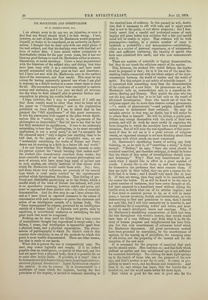The Phonograph an ...
...
Dr. Mackenzie and Spiritualism
I Am always sorry to do any one an injustice, or even to find that any friend should think I do him wrong. Iliad, however, no sort of idea that Dr. Mackenzie would propound himself, or desire to be considered, as an authority on Spiritualism. I thought that he dealt only with one small phase of the vast subject, and that his dealings even with that had not been of recent date. I have mixed rather extensively in Spiritualistic circles for the past seven years, but it has not been my good fortune to meet Dr. Mackenzie either at stances, discussions, or social meetings. I have a large acquaintance with the literature of the subject also, and during that time have been busy with it as a contributor, and have made myself acquainted with what goes on here and elsewhere; but I have not met with Dr. Mackenzie, save in the earliest days of the movement, and then rarely. This must be my excuse for having apparently ignored one whom I am glad to welcome as a fellow-worker in a cause where there is room for all. His researches must have been conducted in esoteric secrecy and seclusion, and I am sure we shall all welcome the day when he feels himself able to prevent further misconception by placing his results before us.
I hope, however, that I may be pardoned if I still say that these results must be other than what he hints at in his paper on “Crystallomancy,” and in the explanation published on June 28th, if I am to admit that he has grasped the” full significance” of this great movement. It was his statements with regard to the place which Spiritualism fills in “adding weight to the arguments of the philosopher on immortality” that led me to say that he had not fully estimated its significance. It was to me extremely astonishing to hear that “Spiritualism, in its most extended application, is not a social need,” is not “a necessity for the educated mind;” only a degree less startling than to be told that, in the opinion of a thoughtful man, no one “moderately considering the works of Nature and Providence can be wanting in a faith in a future life and world.”
I do not know whether Dr. Mackenzie intends to enter his protest against the a much learning that makes mad” the student who immoderately considers these works; but most assuredly many of our most eminent philosophers and men of science, who have spent long years of patient care in such studies, are utterly destitute of that robust faith which Dr. Mackenzie would credit them with. Nay; they, and those whom they influence, are precisely of the mental type which is most easily reached by the experimental method which Spiritualism furnishes. That feeling of profound and distrustful questioning as to the future, which a careful study of the book of Nature has induced, will yield to no speculative reasoning, however subtle and acute, and must be approached from another side—the side of scientific demonstration. And the first step is—as I have always felt, and as I have found in repeated instances in the course of conversation with such inquirers—to prove the existence and action of an intelligence outside of a human body. The “force unrecognised by science, governed by an intelligence outside of a human body,” a formula now grown stale by repetition, is nevertheless unshaken as embodying the first great truth that must be recognised.
Nothing can be done until the fallacy that a long course of materialistic thought has engendered is swept away; the fallacy, I mean, that intelligence is impossible apart from a physical brain, and a physical organisation. The phenomenon of psychography to which Dr. Slade’s visit to this country drew attention, is one of the methods by which this point is most readily demonstrated. There are other means, but that is ready to our hands.
When this is proven the rest is comparatively easy. The next step comes logically and simply. If it be indeed possible that an intelligence, no matter of what sort, can live and act apart from a physical body, then it is possible for me to exist after bodily death. If possible, is it true? Can it be demonstrated that human beings have, in spiritual existence, survived physical dissolution? Again Spiritualism supplies the answer. It can be proven. It is demonstrated in a multitude of cases which the inquirer, leaving the first principles of his inquiry, is invited to estimate according to <... continues on page 7-185 >
Editor's notes
Sources
-
London Spiritualist, No. 307, July 12, 1878, pp. 20-1


